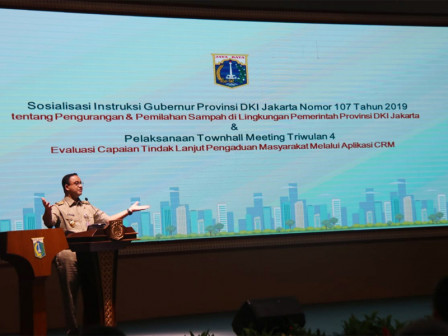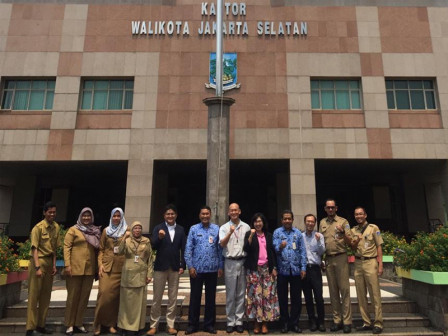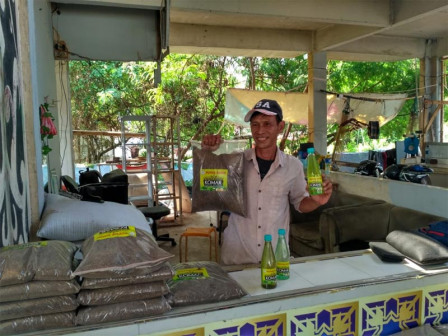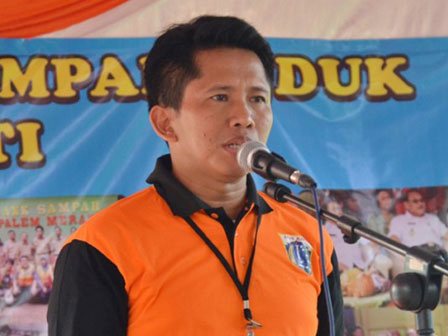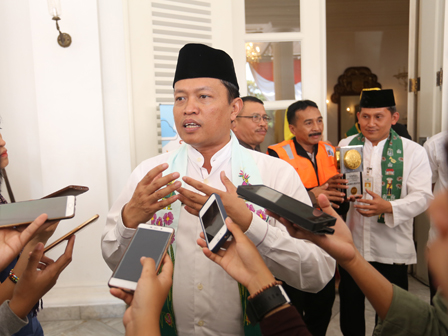Government Offices Required to Sort Waste
Reported by Mustaqim Amna | Translated by Nugroho Adibrata
The Jakarta Governor Anies Baswedan, instructed all offices, schools and health service facilities serving under Jakarta Provincial Government to become the pioneers in reducing and sorting waste, on Monday (12/30).
This is the 2020 milestone
It is listed in Gubernatorial Instruction number 107/2019, which was socialized at the Jakarta Education Agency Building, South Jakarta.
"This matter is not about the Bantargebang Landfill had almost reached its maximum capacity, but it is a global problem and Jakarta is the largest megapolitan city in the southern hemisphere," he stated.
South Jakarta Optimizes Waste Management in SchoolsYet Jakarta should not be an example of the biggest polluter in the southern hemisphere of the world, which means a mindset change is needed.
"Mindset change means that not all residual consumption is waste, but the material for the next process. Thus we can utilize it well," he explained.
Thereby the principles of 3R (Reduce, Reuse and Recycle) should be grown into the community, including sorting, as not all are waste. It is about how the whole community is responsible for their consumption activities, thus nothing is wasted without being utilized.
"I hope it can run well. This is the 2020 milestone, the year of change in waste management in Jakarta. Therefore, next year, all the government offices can say that our office is environmentally friendly," he told.
He asserted all offices should make a waste bank. "By the end of January, all government and BUMD offices must have it, including schools," he stressed.
If it is achieved, the volume of waste will reduce 30 percent. "This reduction is upstream, instead of downstream, thus the burden of transporting waste is reduced. Thus it can save transportation costs up to Rp 1 billion per day," he explained.
On that occasion, Jakarta Environment Agency Head Andono Warih explained reducing waste from its source was the highest level of citizen participation in waste management.
"Before it touches the community, we will start from the government offices, schools and health service facilities as a pioneer for others," he explained.
By so locals could actively help in reducing, sorting and processing waste at the source.
He continued the Gubernatorial Instruction number 107/2019 required city agencies to conduct waste reduction and sorting, prepare disaggregated waste storage areas in each office room, conduct segregated waste processing, ensure the implementation of waste segregation according to the implementation instructions, collect waste according to the specified schedule and ensure the establishment and operation of the waste bank in the office and school environment.
It also regulates the obligation to sort waste in the local government environment into seven types, namely organic waste, paper waste, electronic waste, hazardous and toxic waste (B3), plastic waste, metal waste and residues.
"A collaborative approach with the community to jointly reduce waste at the source is the most appropriate strategy choice in Jakarta. We try to set an example from our offices," he told.
The composition of Jakarta's waste sent from waste disposal sites (TPS) to Bantargebang consists of various types of organic waste reaching 59 percent and 18 percent inorganic waste.
"If it runs well, it will reduce waste weight to Bantargebang more than 50 percent," he expressed.
He uttered one of the characteristics of modern society was the culture of sorting waste. Sorting was an important stage in managing waste thus waste can be reused. The sorted organic waste can be processed into compost using a biopori infiltrator or composter hole and inorganic waste can be saved through waste bank for further processing in the recycling industry. Only residues end up at the landfill.
"In the developed cities of the world, we will find how the whole community takes care of their own waste. Waste is not only managed by the government, as it produces all of us," he stated.
As for the information, to reduce and sort waste in Jakarta, the city has waste management policy packages, either those that are still in the process of preparation or those that have been established in the form of Gubernatorial regulation and instruction.
Those policies are;
1. Gubernatorial Regulation number 108/2019 on Jakarta's Regional Policies and Strategies in Managing Household Waste and Similar Household Waste, with a target of reducing 22 percent in 2020
2. Jakarta Waste Management Road Map, which is currently in the process of targeting a 30% reduction in waste in 2022
3. Gubernatorial Regulation on Eco-Friendly Shopping Bags, which is currently being processed, with the target of changing the behavior of Jakartans to save money in the use of containers and plastic bags
4. Gubernatorial Instruction number 107/2019 on Reduction and Sorting in the Jakarta Provincial Government Environment, which will be socialized at this time.

